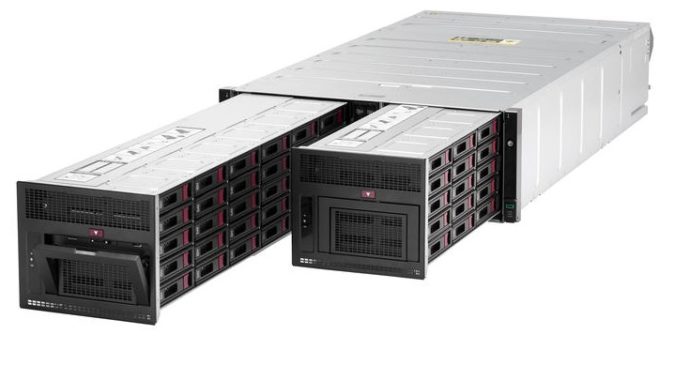HPE doubled down on its memory-driven computing vision while expanding its processor portfolio with the announcement yesterday of the company’s first ARM-based high performance computing system (not counting the ARM-based Moonshot, which targeted the datacenter and didn’t pan out), along with other purpose-built solutions designed to help enterprises adopt HPC and AI applications.
HPE’s new Apollo 70 system uses Cavium’s 64-bit ARMv8-A ThunderX2 Server Processor and is designed for memory-intensive HPC workloads, with up to 33 percent more memory bandwidth than industry standard servers, according to Bill Mannel, HPE’s vice president and general manager, HPC and AI Segment Solutions. He said the Cavium chip reverses recent trends in which “pretty much all of the characteristics of memory – Gbytes per core, bytes per FLOP – have been declining.”
HPE describes the Apollo 70 as a dense, scalable platform that supports standard HPE provisioning, cluster management and performance software. It provides access Red Hat Enterprise Linux, SUSE Linux Enterprise Server for ARM and Mellanox InfiniBand and Ethernet fabrics.
“Enterprises are looking for ways to leverage HPC and AI in their business processes to gain faster insights and intelligence for competitive advantage,” said Steve Conway, SVP of Research, Hyperion Research. “HPE’s next-generation and new Apollo systems will facilitate that adoption by providing easier integration and management while delivering extreme density to reduce data center footprint and extend the range of HPC and AI use cases.”
HPE also introduced the Apollo 4510 Gen10 System, built for object storage and, according to HPE, delivering one of the highest storage capacities in any standard depth 4U server, with up to 600TB per system and 16 percent more cores than the previous generation of the product.
“The platform is ideal for customers looking to optimize the retention and placement of massive amounts of data, using object storage as an active archive with immediate access to structured and unstructured data,” HPE said. The system supports NVMe cards that can be used as a Scality RING metadata cache enabling 100 percent of bulk drive bays for object data storage.
HPE’s new Apollo 2000 Gen10 System is a multi-server platform with a “plug and play” system configuration designed for customers with limited data center space who need to support enterprise HPC and deep learning applications.
The system has a scale-out architecture and a shared infrastructure. It supports NVIDIA Tesla V100 GPU accelerators for deep learning training and inference, and uses Intelligent System Tuning to accelerate application performance. It also includes proprietary HPE firmware security features, such as the HPE iLO5 server management and Silicon Root of Trust.

HPE’s StoreEver LTO-8 Tape is designed to provide an added layer of protection against cybercrime and ransomware attacks with offline and off-premises data protection. HPE called it a long-term retention solution that allows customers to offload primary storage while reducing the cost of storing data overtime. It has up to 30 terabytes of capacity per tape cartridge, double the capacity in the same data center footprint as previous generation tape, making it suitable for HPC data centers, HPE said. The system stores up to 300 petabytes of data in the HPE T950 tape library and 1.6 exabytes of data in the HPE TFinity tape libraries. Full height drives offer up to 360MB/s transfer rate speeds, a 20 percent increase from the LTO-7 generation, according to HPE.
According to Hyperion Research (formerly a group within industry analyst firm IDC), HPE is the HPC market leader, with 36.4 percent market share and a 4.4 percent share gain in CYQ2. The company, along with other systems providers, has attempted to expand their market reach by offering systems designed to accelerate adoption of advanced scale and HPC-class technologies in the enterprise. But Mannel admitted that these attempts by HPE, and its competitors, have met with mixed results.
The problem, he said, is in the nature and accessibility of the lower end of the HPC market, for which pre-packaged solutions are best suited. The upper portions of the HPC market are organizations with advanced computing and sophisticated staff resources, some of which even run their own HPC stacks and cluster managers. The middle market tends to run packaged solutions on an a la carte basis, Mannel said, elements that they tie together themselves into an integrated HPC capability.
He said it’s the lower portion of the market – start-ups or companies with 50-100 employees that are new to HPC and to AI – has the strongest need for help with pre-built solutions.
“But can I say any of it us have been successful at that?” Mannell said. “I’d say not as much as we’d like to be… I think all the companies, including ourselves, have a challenge getting to those customers. The format is right, they want these kinds of turnkey solutions. But how we get to them is a challenge.”
HPE said the Apollo 2000 and Apollo 4510 are available today. The StoreEver LTO-8 Tape will be available next month and the Apollo 70 in 2018.



























































